Opinion: Universal CMS? From a pragmatist, it’s not yet so "Universal"

The term "Universal" evokes the image of a universal remote control capable of managing various devices from different brands. Similarly, the concept of a Universal CMS aims to provide a consistent experience across diverse content delivery channels and technologies. However, the current implementations of Universal CMS still fall short of achieving true universality.
Andrew Kumar is the Global Vice President of Customer Solutions and ecosystem at Uniform and a CMS Critic Contributor.
Let's start by acknowledging something “Universal” in nature: Being a critic is not always easy.
- Albert Einstein: "Whoever undertakes to set himself up as a judge of Truth and Knowledge is shipwrecked by the laughter of the gods."
- Oscar Wilde: "The critic has to educate the public; the artist has to educate the critic."
- Winston Churchill: "Criticism may not be agreeable, but it is necessary. It fulfills the same function as pain in the human body. It calls attention to an unhealthy state of things."
My goal is not to be a judge, to be laughed at by the gods, or to create pain; rather, I will attempt to educate the public based on my observations to date.
I will start this article with an analogy: donning the critic cap. When I think of the term "Universal," an analogy that comes to mind is a universal remote control.
Universal CMS aims to provide a consistent experience across different content delivery channels and technologies. However, the current crop of Universal CMS solutions falls short of true universality compared to a Universal remote.
A universal remote works across multiple TV brands and even different device types like set-top boxes and DVD players. It doesn't matter if the TVs or devices are Samsung, LG, Sony, Onkyo, KEF, etc… the Universal Remote supports them all.
The current Universal CMS offerings are typically limited to their own brand and only one device type, their own CMS. They don't yet support Universal editing or management with other data sources or platform types, such as Product Information Management (PIM), Digital Asset Management (DAM), or e-commerce systems.
While Universal CMS aspires to be as versatile as a universal remote, it's currently more akin to a brand-specific TV-only remote.
Industry Trends: a snapshot
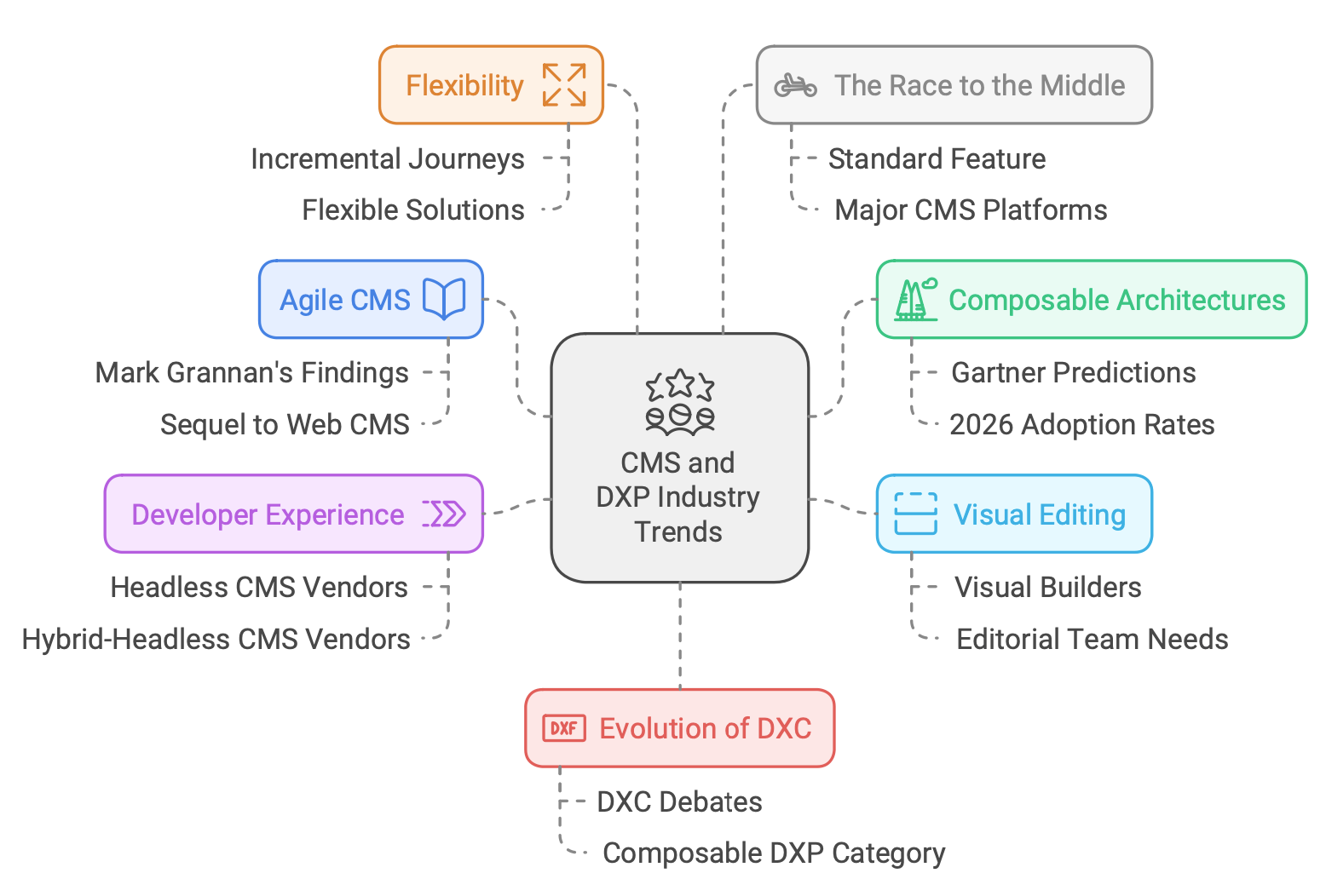
Several trends in the CMS and DXP markets are aligning their stars with the Universal CMS concept:
- Agile CMS, a new model for content and users: Mark Grannan published his findings as far back as November 2018 in his article (and diagram below) illustrating the need for “a tantalizing sequel to web CMS.”
- Increasing adoption of composable architectures: Gartner predicts that by 2026, at least 70% of organizations will be mandated to acquire composable DXP technology, compared to 50% in 2023.
- Focus on visual editing for headless CMSs: Headless CMS providers have all gone through the effort to implement visual builders to address the needs of editorial teams.
- Emphasis on developer experience: Both headless and hybrid-headless CMS vendors are building SDK ecosystems to better support developers.
- Demand for flexibility: Organizations seek solutions allowing gradual, incremental digital transformation journeys.
- The Race to the Middle: Deane Barker argues in his article that the "headless race" in content management systems (CMS) is essentially over. He observes that most major CMS platforms now offer headless capabilities, making them a standard feature rather than a differentiator.
- DXC is dead; long live DXC: About 18 months ago, DXC (which stands for digital experience composition) was an incredibly hot topic with epic debates. 18 months later, DXC has become a staple capability for most DXP and Headless CMS platforms and is likely to get folded into the Composable DXP category by the analysts who coined the term.
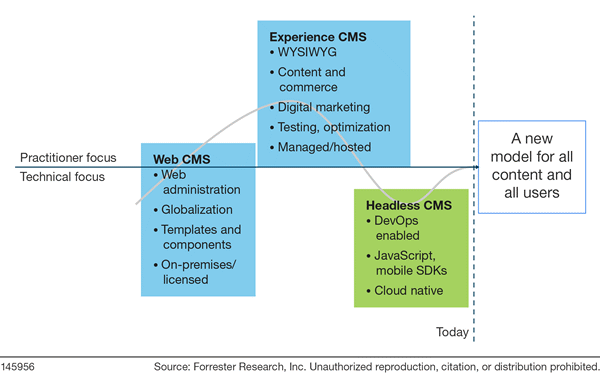
Trend Analysis
The trend of CMS platforms and DXP capabilities reflects a broader pattern in technology markets where initially distinct product categories often converge over time. This convergence can benefit users by providing more comprehensive solutions but may also lead to decreased innovation as vendors focus on matching competitors rather than pioneering new features.
This trend emphasizes the importance of looking beyond technical features when deciding on a CMS for businesses. Integration capabilities, scalability, and vendor support may become more critical differentiators in the future CMS landscape.
The current state of Universal CMS
Limited adoption among small DXPs
Preston So coined the concept of Universal CMS, which has been making waves primarily within the legacy Digital Experience Platform (DXP) world. This new paradigm aims to bridge the gap between headless and hybrid-headless CMS solutions, offering a unified experience for developers and content creators.
Interestingly, Universal CMS's traction is concentrated among smaller, legacy DXPs who risk rapidly losing market share. This suggests that the idea may be more of a marketing strategy for these DXPs rather than a widely adopted industry trend.
Innovation or Private Equity Tactic?
It is worth considering whether the Universal CMS concept represents true innovation or a byproduct of standard private equity playbook tactics.
The pattern we're seeing bears striking similarities to common private equity strategies:
- Acquiring established brands with existing customer bases
- Hiring high-profile individuals to generate buzz and raise the company's profile
- Making bold marketing claims and rebranding efforts with limited innovation (dotCMS' Edit Mode Anywhere has been around since March 2020)
- Ultimately aiming to sell the company at a higher multiple
These tactics are often employed to create the appearance of growth and innovation without necessarily delivering substantial improvements to the underlying technology or user experience.
Having attended the Universal CMS conference, I am still unsure if this concept offers genuine advancements in content management or is primarily a repackaging of existing technologies with a new marketing spin. Other industry experts at the conference echoed my sentiment of uncertainty.
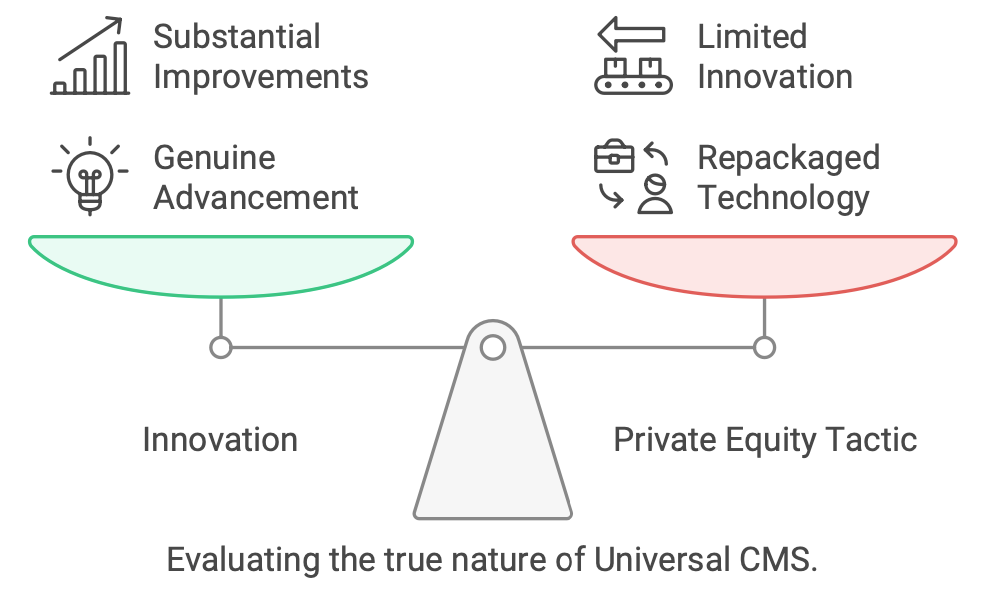
The Evolution of Headless CMS
A core narrative of Universal CMS proponents is that headless CMSs lack editorial interfaces for non-developers. You don’t have to look far to see Contentful or Contentstack and many other headless CMS platforms unveiling a full visual editor for marketing and content operations audiences.
Outdated Perceptions
Just a year or two ago, it was true that many headless CMS solutions prioritized developer experience at the expense of user-friendly interfaces for content creators.
However, the landscape has rapidly evolved:
- Visual Editing: Many headless CMS providers now offer visual editing capabilities, allowing content creators to see real-time previews of their work.
- User-Friendly Interfaces: Significant improvements have been made to create intuitive dashboards and content management experiences for non-technical users.
- Media Management: Advanced media handling features, including image optimization and CDN integration, are now standard in headless CMS platforms.
- Workflow Enhancements: Features like content approval workflows, preview modes, and collaboration tools have been implemented to support team-based content creation.
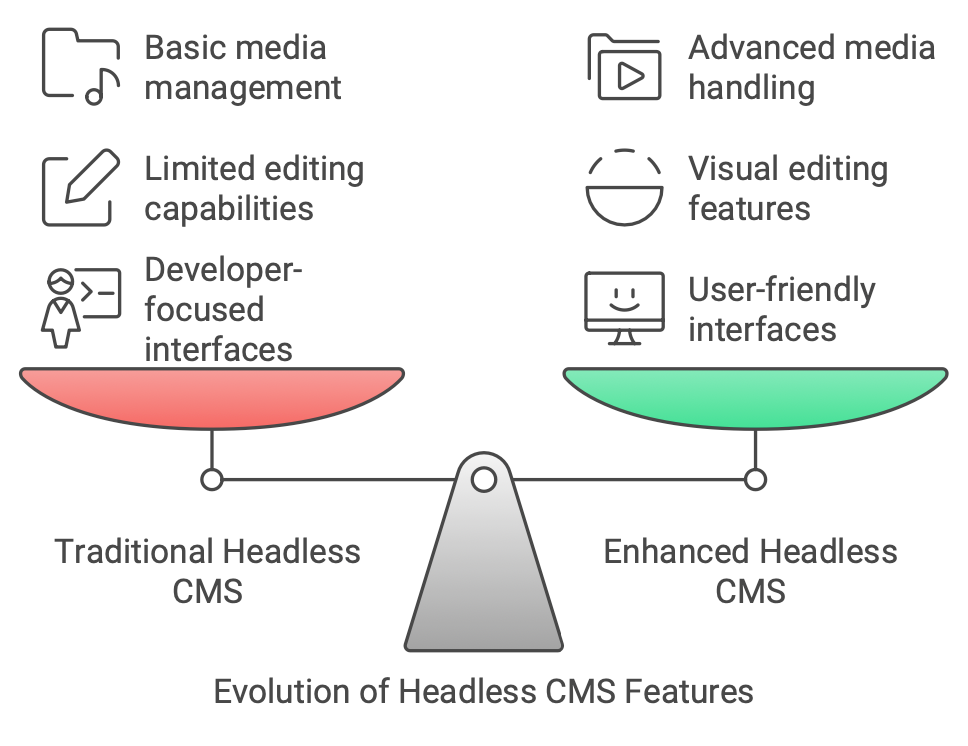
From Headless CMS to Composable DXP
Gartner and Forrester analysts have advocated for composable architectures in digital experience platforms (DXPs) for several years. The core idea is to break down monolithic systems into modular, interchangeable components that can be easily assembled and reassembled to meet changing business needs.
Aspects of composable DXPs include:
- Modularity: Using packaged business capabilities (PBCs) that are independently deployable. (Content, commerce, presentation, analytics, customer data, etc…)
- API-first approach: Enabling seamless integration between different components.
- Cloud-native architecture: Facilitating scalability and flexibility.
Universal CMS? Composable DXP?
The Promise of Universal CMS
Despite the improvements in headless CMS platforms, the Universal CMS concept still offers some compelling ideas:
- Unified Editorial Experience (formerly known as DXC): A shared interface for content teams, regardless of the underlying architecture.
- Developer Flexibility: Allowing developers to use any technology stack while maintaining a consistent content management experience.
- AI Integration: Leveraging artificial intelligence for content generation and management.
- Seamless Transitions: Enabling organizations to gradually move from traditional to headless architectures without disrupting content workflows.
- Marketer first support: where headless and composable still swings developers first, Universal CMS looks to be putting marketers in the driver's seat.
Current Limitations
While the Universal CMS vision is appealing, several challenges remain:
- Limited Adoption: The concept is still relatively new, and widespread adoption has yet to occur. Many organizations still use traditional CMS or have recently invested in headless solutions.
- Feature Parity: Achieving true universality requires feature parity across different use cases. Current solutions often excel in one area (e.g., developer experience) while lagging in others (e.g., visual editing).
- Integration Challenges: Seamlessly integrating diverse technologies and workflows remains a significant hurdle for Universal CMS platforms.
- Learning Curve: The promise of a unified experience may come with a steep learning curve for teams accustomed to specialized tools.
- Lack of Innovation: There really isn't anything new going on with the capabilities presented and shown at the Universal CMS Summit.
Criticisms and Skepticism
Michael Andrews, a content strategy consultant, has recently voiced concerns about the "Universal CMS" concept:
“I've recently encountered discussions about the pipe dream of a 'universal CMS' that would offer everything everyone could want, a concept that, on inspection, turns out to be empty marketing jargon.”
Andrews argues that a truly universal CMS is unrealistic and potentially misleading. But these evolutions of headless CMS, Universal CMS, and Composable DXP are firmly rooted in the needs of a modern digital team. There may be more to come that moves these concepts beyond “empty marketing jargon” to daily-use platforms for modern digital teams moving faster and ever more competitively.
Let’s examine what the road ahead could look like.
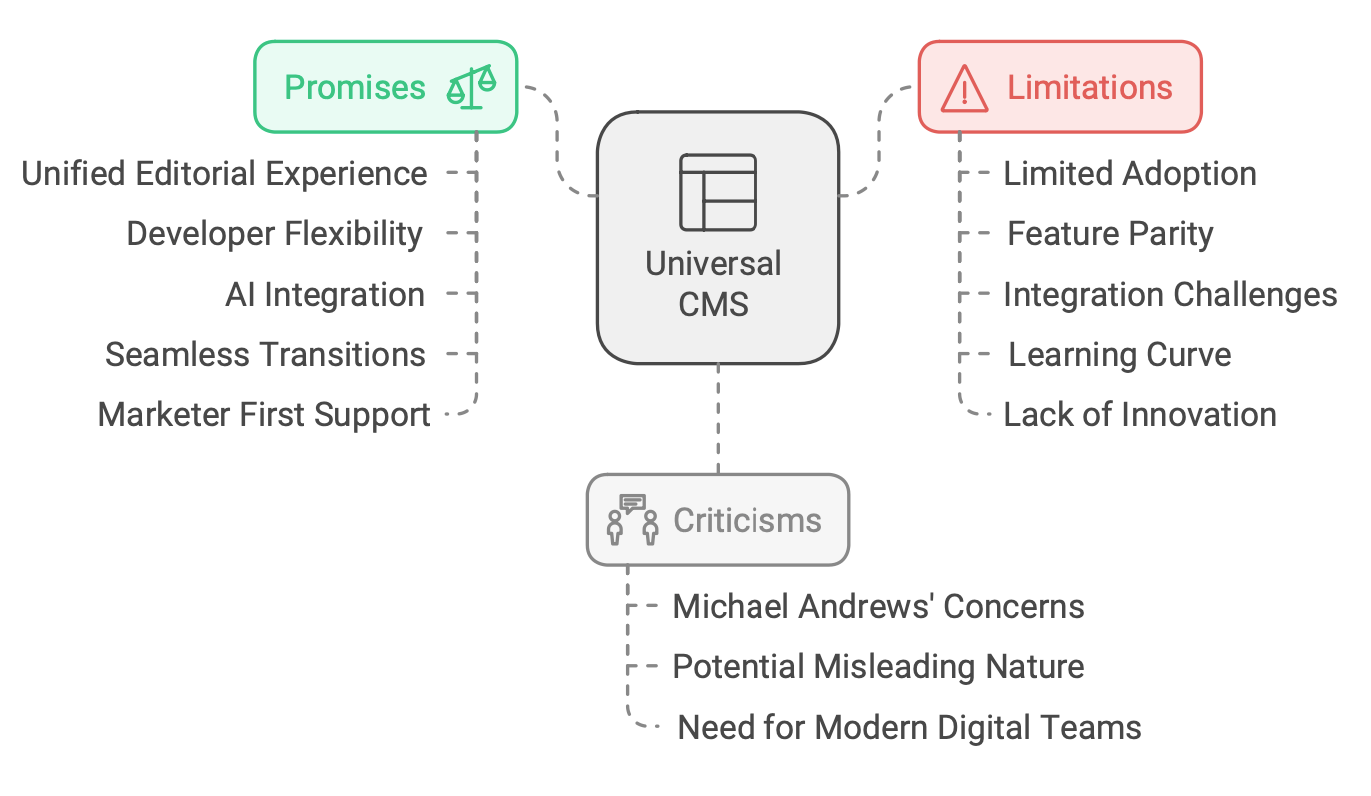
The Road Ahead
Several developments are needed for Universal CMS to live up to its name.
Putting the Universal back in Universal
For Universal CMS to live up to its name and truly emulate the versatility of a universal remote control, several developments are needed:
- Cross-Platform Integration: Support seamless integration with various data sources and platform types.
- Enhanced Interoperability: Ability to work across different CMS ecosystems.
- Comprehensive Device Support: Extending beyond web and mobile to support emerging technologies like IoT and XR.
- AI-Driven Adaptability: Leveraging AI automatically adjust to different content delivery contexts.
- Enhanced Developer Tools: Hybrid-headless CMS solutions must improve their SDKs, CLIs, and other developer-centric features.
- Team-Centric Approach: Future CMS solutions should focus on facilitating collaboration among entire organizational teams, not just individual user groups.
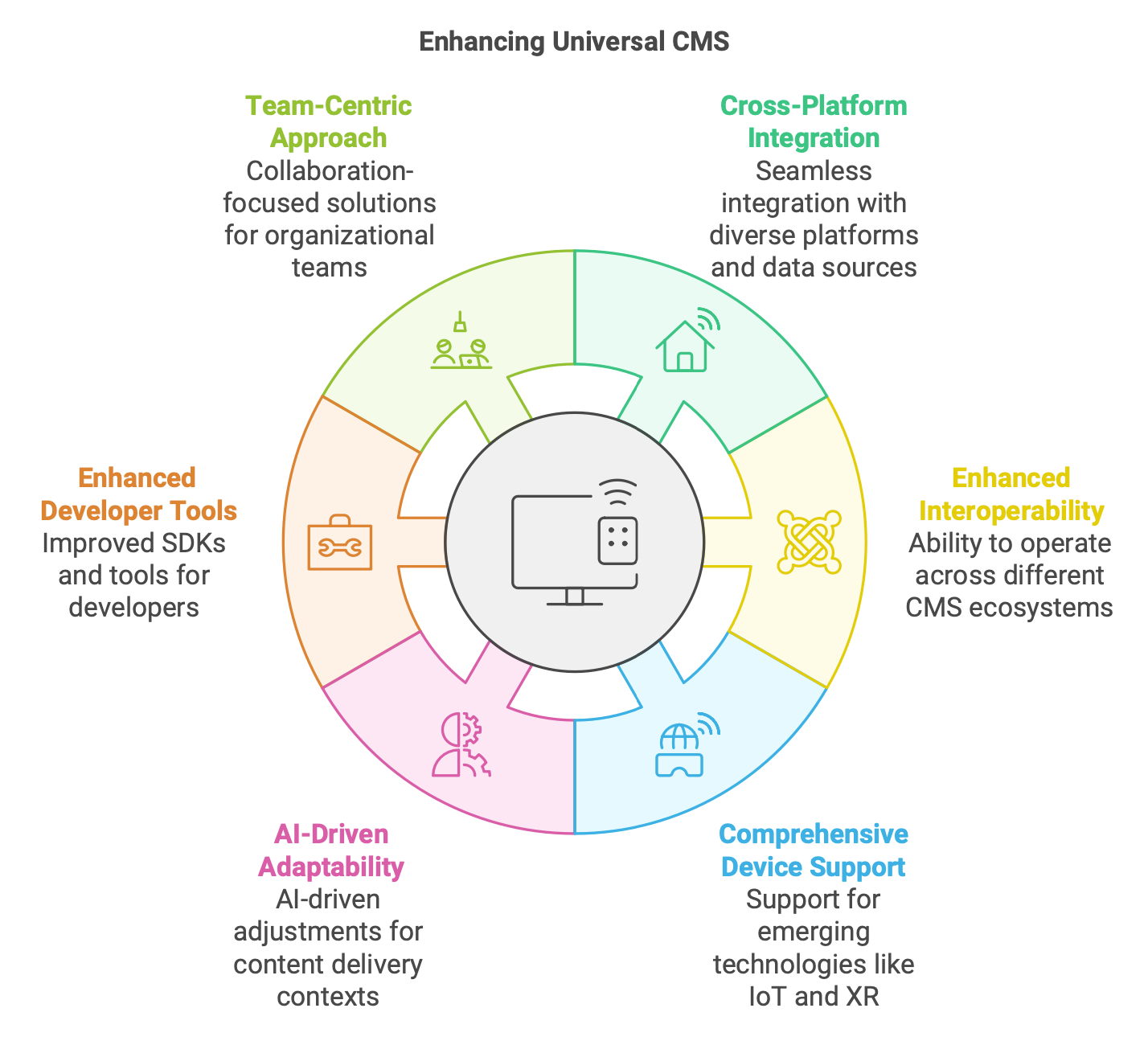
The Uniform Approach
It's worth noting that while no solution currently embodies all the aspects of a truly Universal CMS, platforms like Uniform (disclaimer: I work for Uniform) are approaching the concept from a different angle.
Rather than positioning itself as a Universal CMS, Uniform offers a suite of capabilities that address many of the needs of modern digital teams, which are more akin to the definition of a Composable DXP.
These capabilities (some of which are not part of the UniversalCMS specification) include:
- Composable Platform: Content, data and technology integration from traditional DAM, PIM, Commerce, CMS, DXPs, and any API headless sources.
- Visual Workspace/experience manager: Create, manage and optimize digital experiences visually for any channel.
- Modern Content Management: Create content effortlessly and manage content headlessly or visually.
- Edge Optimization: Convert faster and optimize engagement using personalization and A/B/N experimentation delivered on the edge with zero flicker.
- Modern Front End & Design System Management: Developers and designers can use their front end of choice to power a performant design system.
This approach acknowledges that true universality in content management extends beyond just CMS functionality, encompassing a wider range of digital experience needs.
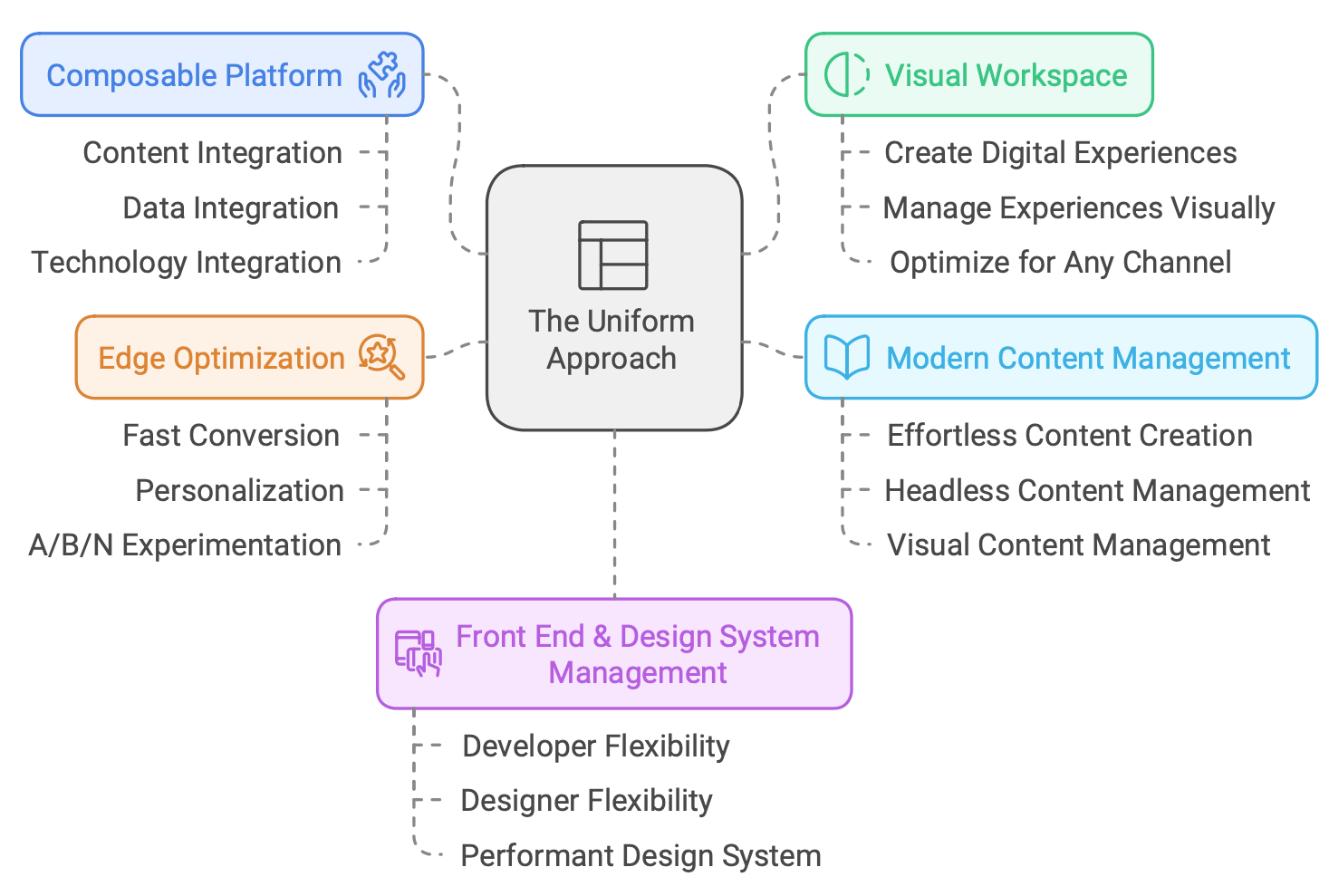
Conclusion
It's essential to recognize that Universal CMS's foundational premise – that headless CMSs lack user-friendly interfaces for non-developers – is no longer accurate. Modern headless CMS platforms have made significant strides in providing intuitive experiences for content creators.
The journey towards more flexible, user-friendly content management solutions is ongoing, and it will be fascinating to watch how these concepts shape the industry's future in the coming years. Whether Universal CMS proves to be a transformative innovation or merely a marketing strategy remains to be seen. Still, its emergence has undoubtedly sparked important conversations about the future direction of content management technologies.
All opinions expressed in this article are solely the author's and don't reflect the opinions or beliefs of CMS Critic, Uniform, this website, and its affiliates.
References:
- So, P. (2024). Universal CMS: The death of "pure" headless CMS. Preston So. https://preston.so/writing/universal-cms-the-death-of-pure-headless-cms/
- Boye, J. (2024). What's Universal CMS all about? Boye & Company. https://www.boye-co.com/blog/2024/6/whats-universal-cms-all-about
- So, P. (2024). Universal CMS: Universally editable for any technology and any channel. Preston So. https://preston.so/writing/universal-cms-universally-editable-for-any-technology-and-any-channel/
- Gleeson, A. (2024). Universal CMS - An Overview. Contento. https://www.contento.io/blog/universal-cms
- Octahedroid. (2024). First Impressions of the Universal CMS. Octahedroid. https://octahedroid.com/blog/first-impressions-universal-cms
- dotCMS. (2024). The Universal CMS is universally editable tech-agnostically and cross-channel. dotCMS. https://www.dotcms.com/blog/post/the-universal-cms-is-universally-editable-tech-agnostically-and-cross-channel
- dotCMS. (2024). Introducing Universal CMS: The end of the Pure Headless era. dotCMS. https://www.dotcms.com/videos/introducing-universal-cms-the-end-of-the-pure-headless-era
- dotCMS. (2024). Shift to Universal CMS: Integrating Flexibility & Functionality. dotCMS. https://www.dotcms.com/blog/post/the-shift-to-universal-cms-integrating-flexibility-and-functionality

CMS Kickoff 2025
January 14-15, 2025 – Tampa Bay Area, Florida
Join us next January in the Tampa Bay area of Florida for the third annual CMS Kickoff – the industry's premier global event. Similar to a traditional kickoff, we reflect on recent trends and share stories from the frontlines. Additionally, we will delve into the current happenings and shed light on the future. Prepare for an unparalleled in-person CMS conference experience that will equip you to move things forward. This is an exclusive event – space is limited, so secure your tickets today.
